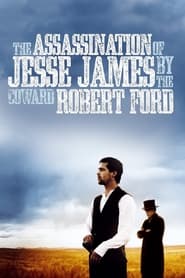The ultimate lesson to be drawn from this admixture of Barry Lyndon (1975) and Days of Heaven (1979) is, of course, don't meet your heroes.
There's an interesting conversation about what speaks to the film's contemporary moment of 2007. The empty, enervated fatalism of the late Bush era, perhaps, melded with the internet-fueled mid-naughties revival of the celebrity stalker? On the other hand, America is always finding ways of mythologising its own history through the lens of criminals more than any country I can think of, even if these 'new' stories are from outsiders of one kind or another and/or they have a revisionist twist to them. One could speculate why this focus on criminality in American cinema is so prevalent (not to mention the 'true crime' genre in literature), although the obvious reading is that has its origins in the guilty subconscious of a nation whose very creation was in effect a monstrous crime against those who already occupied the land, and this is one crime that cannot be psychologically confronted without extreme personal and social trauma.
Back to the film, however, It is of course unsurprisingly that many critics cavil at the voiceover; a voice that, superficially at least, merely repeats what is being shown explicitly via the visuals or implicitly through the narrative. However, a robust defence of the voiceover would surely reference that James, like America, was invariably crafting his own mythologised narrative for History, and so the voiceover in some sense represents the pseudo-wisdom that was to be received by his contemporaries and their descendants — i.e. us. Some heft can be given to this interpretation by the voiceover's the deliberately overblown descriptions of his abilities, such as "He read auguries in the snarled intestines of chickens or the blow of cat hair released to the wind."
The Westerner is the last gentleman, and the movies which over and over again tell his story are probably the last art form in which the concept of honor retains its strength.
— Robert Warshow: Movie Chronicle: The Westerner (1955)
When the assassination happens, it’s less about David taking down Goliath and more like someone taking a wild, wounded animal out of its misery.
— Craig D. Lindsey (Paste Magazine)
More than any character in cinema, Bob Ford recalls Rupert Pupkin, the wannabe standup comic who took Jerry Lewis hostage in The King of Comedy.
— Dana Stevens (Slate)
There is a bizarre anti-mysticism in Jesse James bringing on his own death, like some parody-version of Thomas More or Thomas Becket.
— Peter Bradshaw (The Guardian)
Steeped in the lyrical fatalism of that last great decade for the western, the ‘70s, [the film evinces] a detail-oriented fascination with procedure, albeit not that of the police or the newspaper, but of fate itself, the director languorously, purposefully depicting the titular act as the culmination of a carefully arranged series of events that could lead to only one, fateful outcome. […] The sensuality alight in Ford’s eyes as he itemizes to James their personal similarities lends their bond an added amorous dimension, but the film’s true romance is eventually between Ford and his quixotic idea of James.
We knew this thing was gonna’ fuckin’ tank.
— Director Andrew Dominik (2013)
When Dominik showed Terrence Malick a cut of Jesse James, his reaction was “it’s too slow.”
Synopsis: Outlaw Jesse James is rumored to be the 'fastest gun in the West'. An eager recruit into James' notorious gang, Robert Ford eventually grows jealous of the famed outlaw and, when Robert and his brother sense an opportunity to kill James, their murderous action elevates their target to near mythical status.

